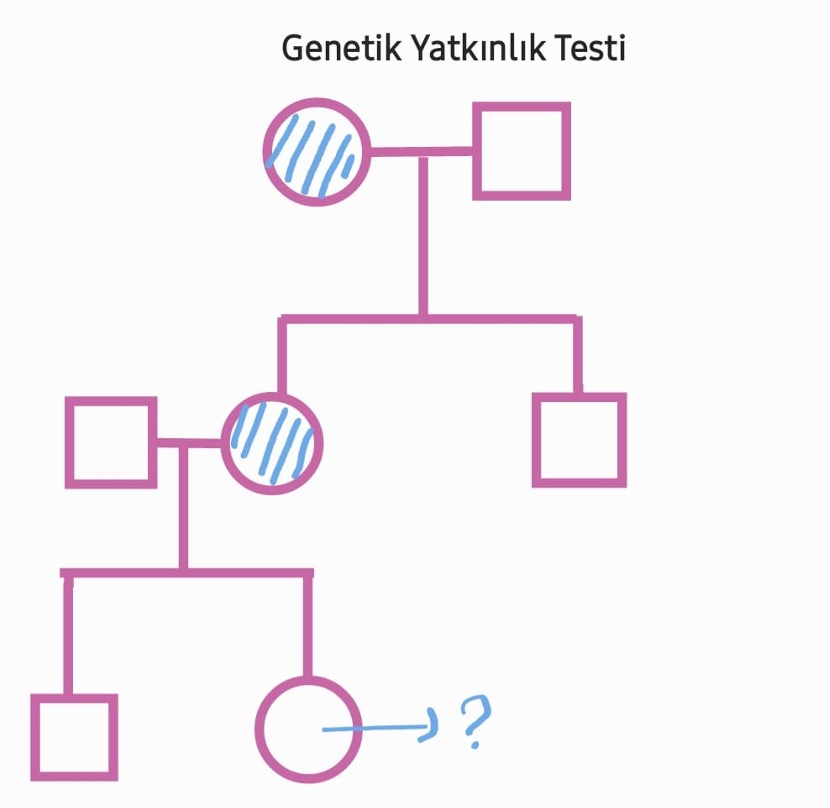by Anna Goddard
Genetic testing is becoming more and more common as our understanding of diseases grows. These tests offer insights into health risks, ancestry, and even personalized medicine. But as the saying goes, with great power comes great responsibility. While these advances are exciting, they also raise ethical concerns. Who should have access to this data? Should we test children for adult-onset diseases? Could genetic results lead to discrimination? Will only the wealthy have access to these tests? In this article, we’ll explore these pressing ethical questions that come with genetic testing.

Graphic of genetic testing results. Image created by author in BioRender (BioRender. Goddard, A. (2025) https://BioRender.com/dnb78m4)
Privacy and Data Security
One of the biggest concerns with genetic testing is privacy. Who owns your genetic information and how is it stored? Many people worry that their DNA data could be accessed by insurance companies, employers, or even hackers. In some cases, law enforcement has used Ancestry databases to solve crimes, raising further questions about personal privacy.
Informed Consent
Do people always understand what they are signing up for when they get genetic testing? Informed consent means individuals should fully comprehend the potential consequences of testing, including possible risks and benefits. These consequences include emotional, social, and financial impacts, as well as the potential for misinterpretation of results and privacy concerns. Should parents be allowed to test their children for conditions that may not appear until adulthood? Some argue this violates a child’s right to make their own medical decisions later in life.
Psychological Impact
Learning about one’s genetic risks can be empowering, but it can also be stressful. Some people may struggle with anxiety after discovering they have a high risk for conditions like Alzheimer’s or cancer. In some cases, people prefer not to know their genetic risks, as living with uncertainty can be less stressful than knowing for sure. This also loops back to our informed consent – just because a patient’s genetic test indicates a high risk for Alzheimer’s, the patient needs to understand that it doesn’t mean they will develop Alzheimer’s.
Discrimination and Stigmatization
Could genetic information be used against someone? In the U.S., the Genetic Information Nondiscrimination Act (GINA) prevents health insurers and employers from using genetic data to discriminate. This was enacted so that humans could benefit from the research in the Human Genome Project. However, GINA does not cover life, disability, or long-term care insurance and these entities may still use genetic information to make decisions. This raises concerns about fairness and social inequality.
Reproductive Decisions
Genetic testing plays a role in reproductive choices. Preimplantation genetic diagnosis (PGD) allows parents undergoing in-vitro fertilization (IVF) to select embryos based on their genetic makeup. The purpose of PGD is to identify genetic problems that can cause implantation failure, miscarriage and birth defects in a resulting child. While this can help prevent genetic diseases, it also raises concerns about “designer babies” and the ethics of selecting for traits beyond health such as gender, height, or intelligence.
Testing in Ancestry and Recreational Genetics
Direct-to-consumer genetic testing, where individuals purchase and perform genetic tests without the involvement of a healthcare provider such as 23AndMe, has become popular for learning about ancestry and heritage. However, these tests sometimes reveal unexpected family secrets, such as unknown siblings or misattributed parentage. Additionally, some companies share data with law enforcement which has led to the resolution of cold cases, but also concerns about genetic privacy. For example, the suspected Golden State Killer was identified using online genealogical sites to find a DNA match to a relative of his. However, the suspected killer did not use the genealogy site and therefore never consented to his DNA being used to compare to DNA from the crime scenes.
Genetic Testing in Research
Genetic databases currently play a role in research – they help elucidate gene function, estimate the number of people with a genetic mutation in populations, differentiate among subtypes of diseases, and improve medical intervention. These databases have many security safeguards in place including securing informed consent and following certain protocols to collect the information. Genetic research holds promise for medicine, but ethical concerns remain. Are research participants fully aware of how their genetic data will be used? Should researchers inform participants if they discover a serious health risk in their DNA? Some argue that individuals have a right to know, while others believe this could cause unnecessary anxiety without clear treatment options.
Equity and Access
Genetic testing can be expensive and access to follow-up care is not equal for everyone. Wealthier individuals may benefit more from genetic insights, leading to disparities in healthcare. Individuals in rural or underserved areas may have limited access to specialized healthcare services and genetic testing. There may be language barriers that prevent accessing and understanding genetic information. Historical and ongoing disparities in healthcare can lead to distrust, impacting access to genetic services. A shortage of trained professionals in certain areas can also limit access to genetic services. Ensuring fair access to genetic testing and treatment is an ongoing ethical challenge.

Pedigree or family tree. Circles represent females while squares represent males. Blue stripes inside the shape indicates disease. Question mark associated with the last circle means we do not know if that child will have the disease. Image Source.
Genetic testing offers incredible possibilities for health and science, but also introduces ethical concerns that must first be addressed. Balancing privacy, consent, and fairness is crucial as technology advances. What do you think? Should there be stronger regulations or should individuals have complete control over their genetic data? At the end of the day, who gets to make these decisions?
